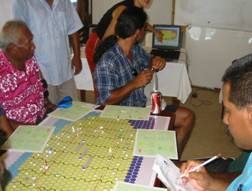|
AtollGame, a computer-assisted role playing game
supporting equitable groundwater management
in Tarawa atoll (Republic of Kiribati)
A. Dray, P. Perez, P. D'Aquino
Objectives
 AtollGame
was designed and implemented within the framework of the Companion Modelling
Approach (ComMod). The game aims at providing information about the complexity
of interactions at stake dealing with groundwater management in a small
but nonetheless overcrowded atoll in Micronesia. The game also aims at
enhancing communication between stakeholders with conflicting views since
local interests based on customary rules seldom match public interest
officially represented by Government institutions (landownership, water
rights, environmental risk). The final goal was to support the eventual
willingness of the different parties to explore new management scenarios
to reach a collective agreement on equitable management of groundwater
on Tarawa and to secure the long-term sustainability. AtollGame
was designed and implemented within the framework of the Companion Modelling
Approach (ComMod). The game aims at providing information about the complexity
of interactions at stake dealing with groundwater management in a small
but nonetheless overcrowded atoll in Micronesia. The game also aims at
enhancing communication between stakeholders with conflicting views since
local interests based on customary rules seldom match public interest
officially represented by Government institutions (landownership, water
rights, environmental risk). The final goal was to support the eventual
willingness of the different parties to explore new management scenarios
to reach a collective agreement on equitable management of groundwater
on Tarawa and to secure the long-term sustainability.
Description of the game
The set of the game is composed of two identical virtual islands with
simplified shapes and dimensions. One island is sparsely populated with
freshwater available, the other one is overcrowded with already polluted
groundwater. Information available on the boards is: the land tenure,
the pumping sites and the water distribution system. An Agent Based Model
(ABM) of the game taking charge of biophysical processes is run during
the playing sessions. It provides indicators dealing with climatic hazard,
lens salinity and lens pollution.
8 players are allocated on each island and take the role of landowner
and head of family. Players' profile includes job, number of members in
his household, water needs and equipments. Players' objective is to provide
enough drinking water (quality and quantity) to his family by investing
into new water equipments according to their income. Players also have
to accommodate new relatives on their land.
The game is divided into 2 sets of 3 rounds. Each round represents a
one-year period. The first set is dedicated to individual strategies,
the second set to collective rules. An important debriefing stage is then
dedicated to collective analysis of the situation and proposals for new
scenarios. The game being flexing enough, emerging individual strategies
(loan bargaining, importing high quality filters) demonstrated the ability
of the players to innovate and interact during the game.
Use of the game
The game has been played once during a 2-day workshop involving 18 participants
and gathering representatives from Government agencies and local communities.
Although game sessions delivered successful outcomes, the final stage
of the project is characterised by the upheaval of contradictory Government
stands that undermine the whole process.
Software
You can download the Cormas model
source code and the model documentation (as a set of UML diagrams).
References
Dray A., Perez P., Jones N., Le Page C., D'Aquino P., White I. and Auatabu
T. 2006. The AtollGame experience: from Knowledge Engineering to a Computer-assisted
Role Playing Game. Journal of Artificial Societies and Social Simulation,
9(1). 
For more information, contact the
corresponding author
|

